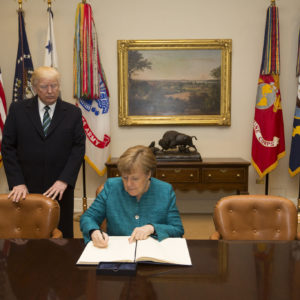Angela Merkel is on her way out as chancellor of Germany, but she appears to have given American energy producers a parting gift: a liquefied natural gas (LNG) terminal. The news offers American energy companies a new opening to a major European market previously blocked by Germany’s focus on renewable energy, especially wind and solar.
Under the terms of the new deal, the German government will co-finance the construction of a $576 million LNG shipping terminal in northern Germany, a sign that President Trump’s lobbying efforts in Europe may have paid off. The U.S. has been increasing its exports of natural gas to Europe for several years, sending just shy of 30 billion cubic feet of LNG to Spain last year. Eastern Europe has also welcomed American energy, seeing it as a welcome alternative to Russian energy.
Analysts say that, in the short term, importing American energy will have little impact on the Germany economy. For Americans, however, access to the biggest economy in Europe is an important step, especially since German energy policy has made it difficult for American companies to break in.
For years, Germany’s clean energy programs have been the envy of American environmentalists and a headache to implement. The ambitious Energiewende program sought to transition the country away from fossil fuels and nuclear energy towards carbon-free renewables like wind, solar, and hydro-power. Specifically, the energiewendge program calls for 80-95 percent reduction of the 1980 greenhouse gas levels by 2050. To accomplish these lofty goals, the Germany government has engaged in ambitious wind and solar subsidy programs, hoping to bolster the lowest carbon energy options.
In the meantime, Germany has struggled to solve the intermittency problem of how to keep the lights on when the wind isn’t blowing and the sun isn’t shining. To keep its industrial economy on track, it has routinely been forced to rely on fossil fuels and nuclear energy.
Even though nuclear energy remains the most scalable carbon-free energy option, Germany has long resisted adopting it on a broad scale. In 1998, a coalition government formed around abandoning nuclear power altogether.
Merkel’s coalition has had an on-again, off-again relationship with nuclear power for years. In 2010, her government announced that it would reverse an earlier law phasing out nuclear power. Instead, operating times at the nuclear plants were extended 8-14 years. The Fukushima disaster in Japan led to a rapid reversal of policy. By the summer of 2011, more than 80 percent of the German Bundestag had voted to shutter nuclear plants, with critics saying that the plan didn’t move fast enough.
The last German nuclear plant in operation is scheduled to close in 2023, leaving the country scrambling to find ways to pick up the slack without adding to its carbon footprint. Natural gas could be part of the solution, and American companies are hoping it’s LNG produced in the USA.
Germany’s alternative energy policies have kept it largely closed to American companies. American companies lack the expertise to build offshore wind, meaning that contracts for upcoming projects in the Baltic and North Sea have gone to the Danish company Ørsted and the German companies KNK and Innology. In fact, many of America’s own domestic wind farms are often built by foreign companies.
Meanwhile, the solar industry remains tumultuous and fragmented. Twenty-five solar panel manufacturers closed between 2012 and 2017. Last year, two solar panel manufacturers successfully petitioned the Federal Trade Commission to impose protective tariffs, but the measure seems to have hurt the broader industry, rather than helped.
The Germans have pitched their LNG decision as a move to diversify its energy portfolio while also improving relationships with Washington. Trump has repeated criticized Germany for being overly dependent on Russian energy and has also pushed for the expansion of American energy exports around the world. For American companies, LNG is an opportunity to move into a new market that has otherwise been largely closed to them.

